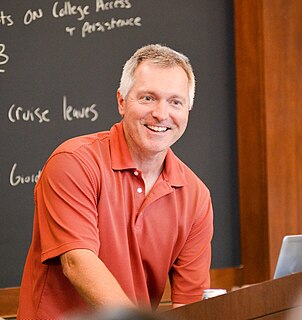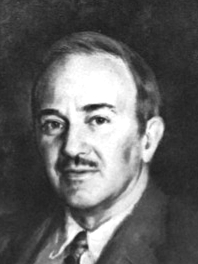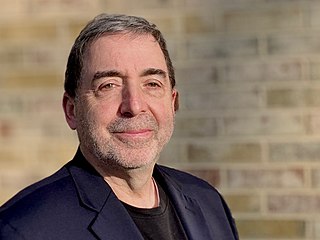
A stock market bubble is a type of economic bubble taking place in stock markets when market participants drive stock prices above their value in relation to some system of stock valuation.
The efficient-market hypothesis (EMH) is a hypothesis in financial economics that states that asset prices reflect all available information. A direct implication is that it is impossible to "beat the market" consistently on a risk-adjusted basis since market prices should only react to new information.

Vernon Lomax Smith is an American economist and professor of business economics and law at Chapman University. He is formerly a professor of economics and law at George Mason University, and a board member of the Mercatus Center. He was also a founding board member of the Center for Growth and Opportunity at Utah State University.

Behavioral economics studies the effects of psychological, cognitive, emotional, cultural and social factors on the decisions of individuals and institutions and how those decisions vary from those implied by classical economic theory.

Eugene Francis "Gene" Fama is an American economist, best known for his empirical work on portfolio theory, asset pricing, and the efficient-market hypothesis.
Experimental economics is the application of experimental methods to study economic questions. Data collected in experiments are used to estimate effect size, test the validity of economic theories, and illuminate market mechanisms. Economic experiments usually use cash to motivate subjects, in order to mimic real-world incentives. Experiments are used to help understand how and why markets and other exchange systems function as they do. Experimental economics have also expanded to understand institutions and the law.
Econophysics is a heterodox interdisciplinary research field, applying theories and methods originally developed by physicists in order to solve problems in economics, usually those including uncertainty or stochastic processes and nonlinear dynamics. Some of its application to the study of financial markets has also been termed statistical finance referring to its roots in statistical physics. Econophysics is closely related to social physics.

Richard H. Thaler is an American economist and the Charles R. Walgreen Distinguished Service Professor of Behavioral Science and Economics at the University of Chicago Booth School of Business. In 2015, Thaler was president of the American Economic Association.
Charles Raymond Plott is an American economist. He currently is Edward S. Harkness Professor of Economics and Political Science at the California Institute of Technology, Director, Laboratory for Experimental Economics and Political Science, and a pioneer in the field of experimental economics. His research is focused on the basic principles of process performance and the use of those principles in the design of new, decentralized processes to solve complex problems. Applications are found in mechanisms for allocating complex items such as the markets for pollution permits in Southern California, the FCC auction of licenses for Personal Communication Systems, the auctions for electric power in California, the allocation of landing rights at the major U.S. airports, access of private trains to public railway tracks, access to natural gas pipelines, the allocation of licenses for offshore aquaculture sites, the combinatorial sale of fleets of vehicles, and the application of complex procurements. Plott has contributed extensively to the development and application of a laboratory experimental methodology in the fields of economics and political science.

John August List is an American economist at the University of Chicago, where he serves as Kenneth C. Griffin Distinguished Service Professor; from 2012 until 2018, he served as Chairman of the Department of Economics. List is noted for his pioneering contributions to field experiments in economics. As detailed in his popular science book, The Why Axis, List uses field experiments to offer new insights in various areas of economics research, such as education, private provision of public goods, social preferences, prospect theory, environmental economics, marketplace effects on corporate and government policy decisions, and multi-unit auctions.
The goals of experimental finance are to understand human and market behavior in settings relevant to finance. Experiments are synthetic economic environments created by researchers specifically to answer research questions. This might involve, for example, establishing different market settings and environments to observe experimentally and analyze agents' behavior and the resulting characteristics of trading flows, information diffusion and aggregation, price setting mechanism and returns processes.

Edward Hastings Chamberlin was an American economist. He was born in La Conner, Washington, and died in Cambridge, Massachusetts.

Bendheim Center for Finance (BCF) is an interdisciplinary center at Princeton University. It was established in 1997 at the initiative of Ben Bernanke and is dedicated to research and education in the area of money and finance, in lieu of there not being a full professional business school at Princeton.
The Journal of Behavioral Finance is a quarterly peer-reviewed academic journal that covers research related to the field of behavioral finance. It was established in 2000 as The Journal of Psychology and Financial Markets. The founding Board of Editors were Brian Bruce, David Dreman, Paul Slovic, Nobel Laureate Vernon Smith and Arnold Wood. The editor-in-chief was Gunduz Caginalp (2000-2005), Brian Bruce is the current editor.
Robert Mark Isaac is an American academic who uses experimental economics to address basic microeconomic problems. His work has provided new empirical insights for many traditional economic problems, particularly cooperation and collective action problems.

Russell David "Russ" Roberts is an economist, a research fellow at Stanford University's Hoover Institution and president designate of Shalem College. He is known for communicating economic ideas in understandable terms as host of the EconTalk podcast.

Robert James Shiller is an American economist, academic, and best-selling author. As of 2019, he serves as a Sterling Professor of Economics at Yale University and is a fellow at the Yale School of Management's International Center for Finance. Shiller has been a research associate of the National Bureau of Economic Research (NBER) since 1980, was vice president of the American Economic Association in 2005, its president-elect for 2016, and president of the Eastern Economic Association for 2006–2007. He is also the co‑founder and chief economist of the investment management firm MacroMarkets LLC.
Quantitative behavioral finance is a new discipline that uses mathematical and statistical methodology to understand behavioral biases in conjunction with valuation. Some of this endeavor has been led by Gunduz Caginalp and collaborators including Vernon L. Smith, David Porter, Don Balenovich, Vladimira Ilieva, Ahmet Duran. Studies by Jeff Madura, Ray Sturm and others have demonstrated significant behavioral effects in stocks and exchange traded funds.
The Nancy L. Schwartz Memorial Lecture is a series of public lectures held every year by the Kellogg Department of Managerial Economics and Decision Sciences.
Andreas Ortmann is a German-born economist and Professor of Experimental and Behavioural Economics at the UNSW Business School. He is best known for his work on experimental methodology in social sciences, heuristics and coordination games. Vernon L. Smith, in the acknowledgement to his A Life in Experimental Economics, described Ortmann as an "economic theorist, experimentalist, and intellectual historian par excellence in all".










